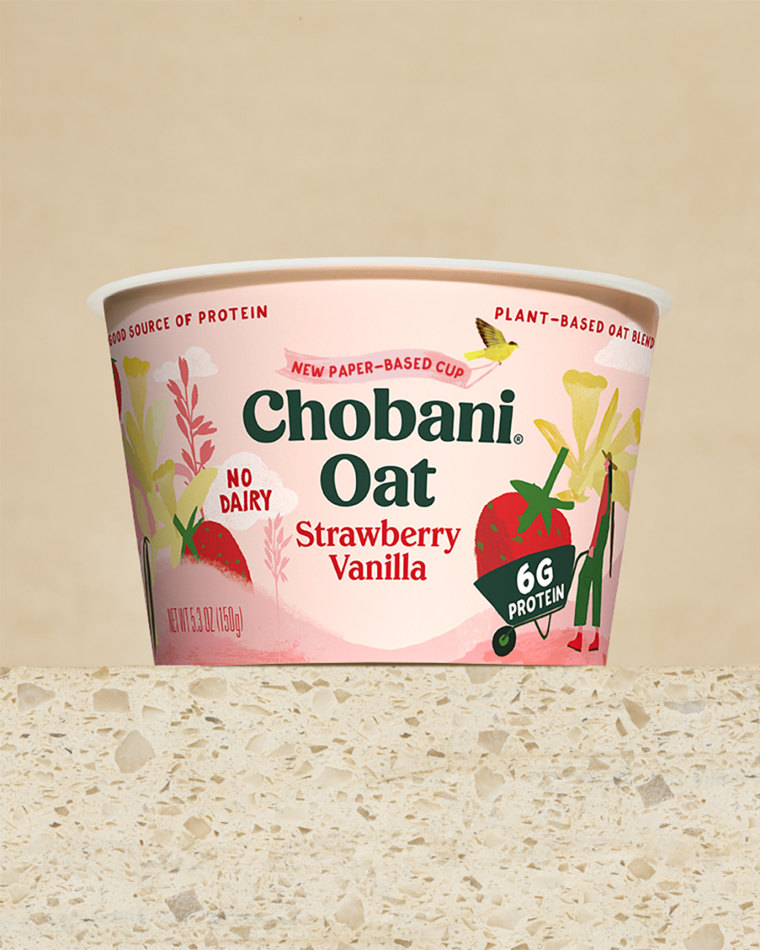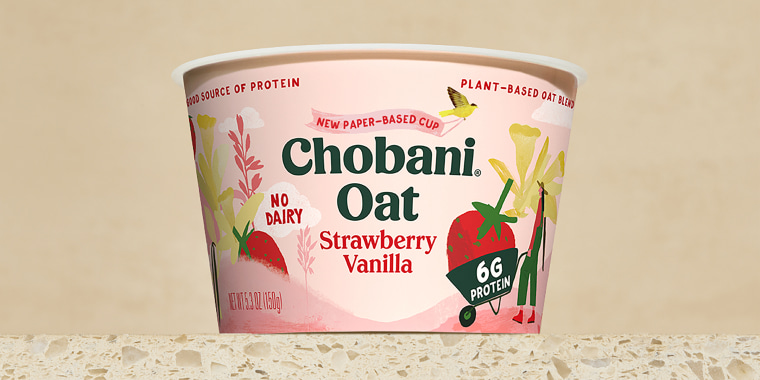On Thursday, Chobani announced that its single-serve Oat Blend yogurts will be shedding their plastic packaging in favor of paper cups as part of the brand's efforts to be more sustainable. The company's other yogurt offerings will remain in the same plastic cup, at least for the immediate future.
According to a company spokesperson, with the release of its new packaging, Chobani will be the only major U.S. food maker with a paper yogurt cup.
The paper cup was several years in the making and it's constructed out of 80% paperboard made from responsibly sourced and renewable material, according to the company. The packaging isn't entirely paper — it has a thin plastic lining to maintain product quality — but Chobani founder and CEO Hamdi Ulukaya said the brand is committed to creating even more sustainable packaging for the rest of its products as time goes on.
"While this paper cup is a step in the right direction, it’s just the beginning," Ulukaya said.
Several other Chobani products are already available in paper-based, recyclable packaging, including the brand's oat milk, cold brew coffee and coffee creamers.

The new cup may be made of recyclable materials, but Chobani says it is aware that our country's recycling system varies from state to state, and the company hopes that this new packaging will help bring awareness to the complexities of recycling and usher in "greater paper recycling capabilities" in the U.S.
“We all have a role to play in protecting our planet,” Ulukaya said in a press release. “People have been asking for a paper cup, and we welcome this challenge to start reducing our plastic use, and to spark a conversation about how we can drive change together.”
Tiffany Legendre, assistant professor at the Conrad N. Hilton College of Hotel and Restaurant Management at the University of Houston, agreed that changes to the country's recycling system will be necessary for packaging innovations such as Chobani's paper cups to make a lasting impact since they still contain a bit of plastic.
"The recyclability of plastics really depends on how consumers dispose of them. Recycling programs in the U.S. are quite complicated and most consumers do not know which plastics are recyclable and which are not," she told TODAY Food.
"For example, even though a peanut butter jar is recyclable, if it is not disposed cleanly, then the plastic cannot be recycled," she added. "Even though most of the beverage bottles are recyclable, if the thin plastic film (wrapped around the bottle) is not removed when disposed, it would be difficult to recycle those bottles."
Ramanan Krishnamoorti, professor of chemical and biomolecular engineering, petroleum engineering and chemistry at the University of Houston, also expressed concern that many plastic-lined paper cups still end up in landfills because consumers are confused about how to recycle them.
"The paperboard material will degrade, but the plastic lining will not, unless it is made of nature-derived plastics or is explicitly labeled as compostable," Krishnamoorti said.
The professor explained that incineration could help burn both the paper and plastic, but that process would release carbon dioxide into the environment.
"That would be similar to what a plastic cup (of similar weight) incinerated would release. In terms of manufacturing process, the production of paperboard with a plastic lining has a higher energy input and more expenditure of water than the production of a plastic cup of comparable use properties," he said.
Still, Legendre was happy to hear that Chobani has joined a growing number of companies that are focusing more on sustainability.
"Many hospitality and food companies that are responsible for producing large amounts of disposable plastics have announced their commitment to reduce the use of plastics in their services," she said. "Particularly, the generations M and Z are very environmentally concerned and many of their decisions are in line with their environmental beliefs. Thus, this is certainly a right direction to take for the new generation of customers."
In March 2020, for example, Starbucks announced it was swapping the plastic liner in its paper cups for biodegradable ones and testing the more eco-friendly cups in five cities for a limited time.
And in 2019, Dunkin' ditched its Styrofoam cups in favor of double-walled paper cups made from paperboard certified to the Sustainable Forestry Initiative Standard (though they're still lined with plastic, so they're not actually recyclable).

